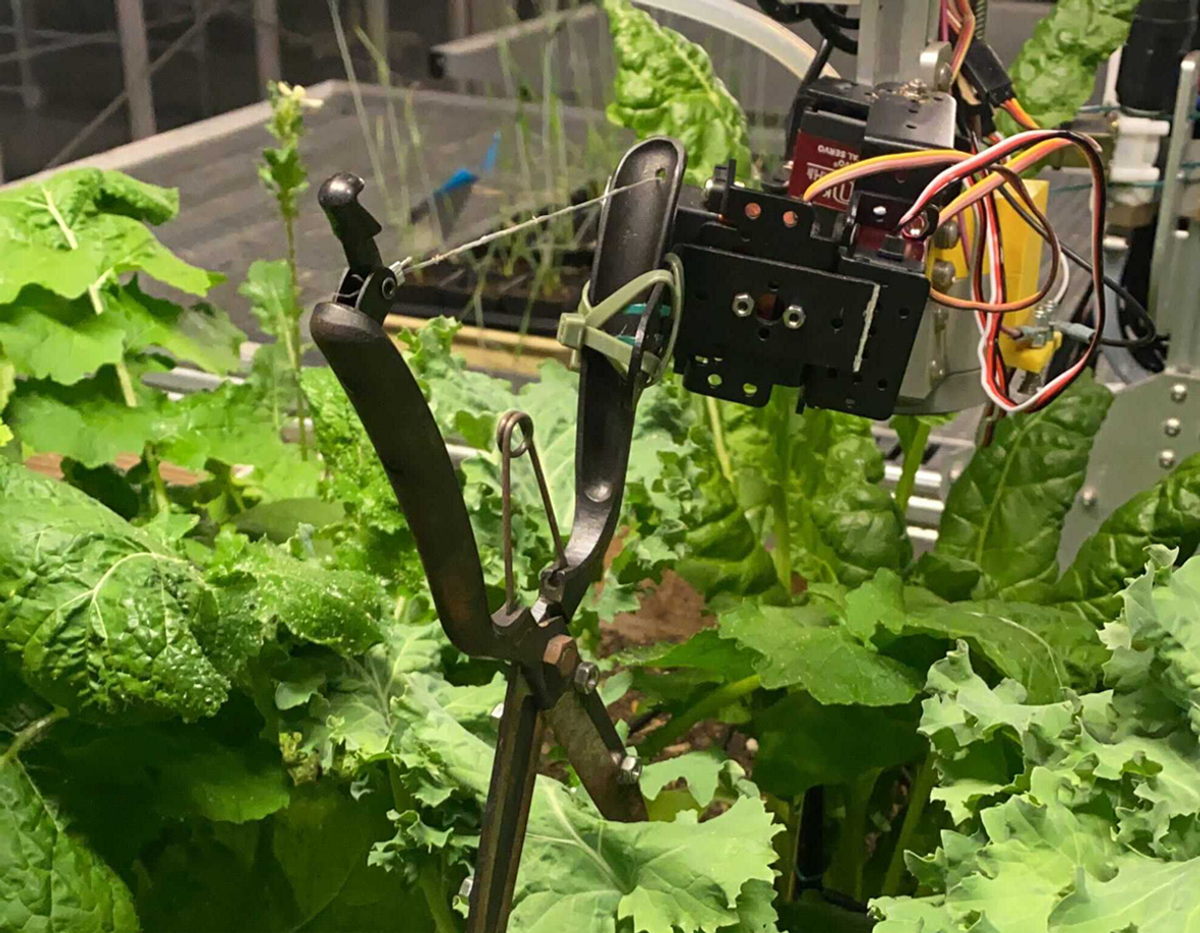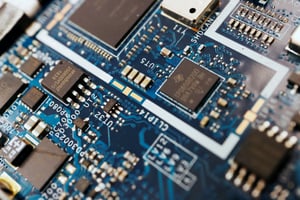You are using an out of date browser. It may not display this or other websites correctly.
You should upgrade or use an alternative browser.
You should upgrade or use an alternative browser.
2025 UPDATE!! AMZN MSFT slash jobs!! AI blackmails! Altman: prepare for AI to be "uncomfortable"…33% jobs gone…BASIC INCOME?
- Thread starter GnauzBookOfRhymes
- Start date
More options
Who Replied?
Robot Passes Turing Test for Polyculture Gardening
UC Berkeley’s AlphaGarden cares for plants better than a professional humanspectrum.ieee.org
Robot Passes Turing Test for Polyculture Gardening
UC Berkeley’s AlphaGarden cares for plants better than a professional human
By
EVAN ACKERMAN
28 MAY 2023

UC Berkeley’s AlphaGarden prunes some of its plants.
UC BERKELEY
I love plants. I am not great with plants. I have accepted this fact and have therefore entrusted the lives of all of the plants in my care to robots. These aren’t fancy robots: They’re automated hydroponic systems that take care of water and nutrients and (fake) sunlight, and they do an amazing job. My plants are almost certainly happier this way, and therefore I don’t have to feel guilty about my hands-off approach. This is especially true that there is now data from roboticists at the University of California, Berkeley, to back up the assertion that robotic gardeners can do just as good a job as even the best human gardeners can. In fact, in some metrics, the robots can do even better.
In 1950, Alan Turing considered the question “Can Machines Think?” and proposed a test based on comparing human versus machine ability to answer questions. In this paper, we consider the question “Can Machines Garden?” based on comparing human versus machine ability to tend a real polyculture garden.
UC Berkeley has a long history of robotic gardens, stretching back to at least the early ’90s. And (as I have experienced) you can totally tend a garden with a robot. But the real question is this: Can you usefully tend a garden with a robot in a way that is as effective as a human tending that same garden? Time for some SCIENCE!
AlphaGarden is a combination of a commercial gantry robot farming system and UC Berkeley’s AlphaGardenSim, which tells the robot what to do to maximize plant health and growth. The system includes a high-resolution camera and soil moisture sensors for monitoring plant growth, and everything is (mostly) completely automated, from seed planting to drip irrigation to pruning. The garden itself is somewhat complicated, since it’s a polyculture garden (meaning of different plants). Polyculture farming mimics how plants grow in nature; its benefits include pest resilience, decreased fertilization needs, and improved soil health. But since different plants have different needs and grow in different ways at different rates, polyculture farming is more labor-intensive than monoculture, which is how most large-scale farming happens.
To test AlphaGarden’s performance, the UC Berkeley researchers planted two side-by-side farming plots with the same seeds at the same time. There were 32 plants in total, including kale, borage, Swiss chard, mustard greens, turnips, arugula, green lettuce, cilantro, and red lettuce. Over the course of two months, AlphaGarden tended its plot full time, while professional horticulturalists tended the plot next door. Then, the experiment was repeated, except that AlphaGarden was allowed to stagger the seed planting to give slower-growing plants a head start. A human did have to help the robot out with pruning from time to time, but just to follow the robot’s directions when the pruning tool couldn’t quite do what the robot wanted it to do.
The robot and the professional human both achieved similar results in their garden plots.UC BERKELEY
The results of these tests showed that the robot was able to keep up with the professional human in terms of both overall plant diversity and coverage. In other words, stuff grew just as well when tended by the robot as it did when tended by a professional human. The biggest difference is that the robot managed to keep up while using 44 percent less water: several hundred liters less over two months.
“AlphaGarden has thus passed the Turing test for gardening,” the researchers say. They also say that “much remains to be done,” mostly by improving the AlphaGardenSim plant-growth simulator to further optimize water use, although there are other variables to explore like artificial light sources. The future here is a little uncertain, though—the hardware is pretty expensive, and human labor is (relatively) cheap. Expert human knowledge is not cheap, of course. But for those of us who are very much nonexperts, I could easily imagine mounting some cameras above my garden and installing some sensors and then just following the orders of the simulator about where and when and how much to water and prune. I’m always happy to donate my labor to a robot that knows what it’s doing better than I do.
“Can Machines Garden? Systematically Comparing the AlphaGarden vs. Professional Horticulturalists,” by Simeon Adebola, Rishi Parikh, Mark Presten, Satvik Sharma, Shrey Aeron, Ananth Rao, Sandeep Mukherjee, Tomson Qu, Christina Wistrom, Eugen Solowjow, and Ken Goldberg from UC Berkeley, will be presented at ICRA 2023 in London.
GnauzBookOfRhymes
Superstar
ADevilYouKhow
Rhyme Reason

Europeans Take a Major Step Toward Regulating A.I.
A draft law in the European Parliament has become the world’s most far-reaching attempt to address the potentially harmful effects of artificial intelligence.

GnauzBookOfRhymes
Superstar
AI in hospitals

 www.wsj.com
www.wsj.com

When AI Overrules the Nurses Caring for You
Artificial intelligence raises difficult questions about who makes the call in a health crisis: the human or the machine?
GnauzBookOfRhymes
Superstar
dont get high on your own supply - google

It only took five hours for an AI model to design a functional computer
Researchers claim that was 1,000 times faster than what it takes humans to design a CPU
It only took five hours for an AI model to design a functional computer
Researchers claim that was 1,000 times faster than what it takes humans to design a CPU
By
Faustine Ngila
Published 6 hours ago

Illustration: Florence Lo (Reuters)
Artificial intelligence is stretching the human limits of computer design, with a new AI model now creating a complete CPU (Central Processing Unit) in just under five hours, compared to the four years it takes Intel to build one.
The achievement was discussed in a research paper (pdf) dated June 27 and authored by 19 Chinese computer processor researchers from five technology colleges. The researchers say their approach is bound to set the stage for the creation of self-evolving machines, forever change the legacy CPU design flow, and reform the global semiconductor industry.
Their CPU, which runs on an AI instruction set named RISC-V 32IA, can successfully run the Linux operating system (kernel 5.15). According to the researchers, it can “perform comparably” against the 1991 human-designed Intel 80486SX CPU.
Their goal is to beat the latest human-designed CPU, while shaping the future of computing. “Our approach reduces the design cycle by about 1,000x [times] because the manual programming and verification process of traditional CPU design, which consume more than 60%-80% of the design time and resources, is completely eliminated,” the paper reads. It claims that humans take 4560 hours (190 days) to complete the entire design of a traditional CPU, such as the Intel K486.
The new CPU, the paper states, achieves an accuracy of 99.99% for validation tests, while the physical design of the chip uses scripts at 65nm technology to generate the layout for fabrication. Its design decomposes the AI CPU’s control and arithmetic units into smaller functional modules.
AI also got its limitations
However, the RISC-V 32IA chip comes with a frequency of 300 MHz, compared to Intel’s human-made 3.6GHz processor, making it slower at processing computer commands.The researchers admit this, saying CPUs made using AI models “perform worse than recent processors such as Intel Core i7 3930K.” They plan to boost the performance of what they call “the world’s first automatically designed CPU” by deploying more elaborated augmented algorithms.
GnauzBookOfRhymes
Superstar
AI's ability to compute inconceivable numbers of simulations is just too powerful means that within 25 years or so humans will no longer be making great discoveries.
yung Herbie Hancock
Funkadelic Parliament
awww shyt
It only took five hours for an AI model to design a functional computer
Researchers claim that was 1,000 times faster than what it takes humans to design a CPUqz.com
It only took five hours for an AI model to design a functional computer
Researchers claim that was 1,000 times faster than what it takes humans to design a CPU
By
Faustine Ngila
Published 6 hours ago

Illustration: Florence Lo (Reuters)
Artificial intelligence is stretching the human limits of computer design, with a new AI model now creating a complete CPU(Central Processing Unit) in just under five hours, compared to the four years it takes Intel to build one.
The achievement was discussed in a research paper (pdf) dated June 27 and authored by 19 Chinese computer processor researchers from five technology colleges. The researchers say their approach is bound to set the stage for the creation of self-evolving machines, forever change the legacy CPU design flow, and reform the global semiconductor industry.
Their CPU, which runs on an AI instruction set named RISC-V 32IA, can successfully run the Linux operating system (kernel 5.15). According to the researchers, it can “perform comparably” against the 1991 human-designed Intel 80486SX CPU.
Their goal is to beat the latest human-designed CPU, while shaping thefuture of computing. “Our approach reduces the design cycle by about 1,000x [times] because the manual programming and verification process of traditional CPU design, which consume more than 60%-80% of the design time and resources, is completely eliminated,” the paper reads. It claims that humans take 4560 hours (190 days) to complete the entire design of a traditional CPU, such as the Intel K486.
The new CPU, the paper states, achieves an accuracy of 99.99% for validation tests, while the physical design of the chip uses scripts at 65nm technology to generate the layout for fabrication. Its design decomposes the AI CPU’s control and arithmetic units into smaller functional modules.
AI also got its limitations
However, the RISC-V 32IA chip comes with a frequency of 300 MHz, compared to Intel’s human-made 3.6GHz processor, making it slower at processing computer commands.
The researchers admit this, saying CPUs made using AI models “perform worse than recent processors such as Intel Core i7 3930K.” They plan to boost the performance of what they call “the world’s first automatically designed CPU” by deploying more elaborated augmented algorithms.
 . I'm a computer engineer major and I planned on going into ASIC and FPGA design. wtf do I do now? I got one year left.
. I'm a computer engineer major and I planned on going into ASIC and FPGA design. wtf do I do now? I got one year left.awww shyt. I'm a computer engineer major and I planned on going into ASIC and FPGA design. wtf do I do now? I got one year left.

GnauzBookOfRhymes
Superstar

World powers in rush to get killer robots on battlefield in AI arms race, as concerns grow they can turn on humans
Here come the Kill-Bots.

Dukaan CEO cops backlash for post announcing layoffs: ‘Stunning lack of empathy’
Dukaan founder and CEO Suumit Shah revealed that 90% of the company’s support staff has been laid off after the introduction of an AI chatbot to answer customer support queries.
Dukaan CEO cops backlash for post announcing layoffs: ‘Stunning lack of empathy’
Dukaan founder and CEO Suumit Shah revealed that 90% of the company’s support staff has been laid off after the introduction of an AI chatbot to answer customer support queries.
SANYA JAINJULY 11, 2023 / 04:06 PM IST

Suumit Shah, founder and CEO of Dukaan
Dukaan, a DIY platform that allows merchants with zero programming experience to set up their own e-commerce store, has become the latest company to axe part of its human workforce due to AI.
Dukaan founder and CEO Suumit Shah revealed that 90% of the company’s support staff has been laid off after the introduction of an AI chatbot to answer customer support queries. In a Twitter thread shared Monday, Shah explained that resolution time went down to 3 minutes and 12 seconds from the previous 2 hours and 13 minutes after the introduction of Dukaan’s own AI assistant.
“We had to layoff 90% of our support team because of this AI chatbot,” Shah wrote, branding it a “tough” but “necessary decision.”
Asked if the laid-off staff were provided with any assistance, he brushed off the query saying further details on layoffs would be revealed in his upcoming LinkedIn post.
“As expected, 'someone' will get offended on behalf of 'someone else', so I had this reply ready: Assistance ke bare mein jab Linkedin pe post karunga tab dekh lena mere dost, yahaan Twitter pe log ‘profitability’ dekhte hai ‘sympathy’ nahi,” he wrote.
“Also – ‘it was tough decision’” he added with a heartbreak emoji – emphasis on “tough decision” was his own, not ours.
Instead of answering questions about the layoffs, Shah wrote a lengthy explanation of how the AI chatbot came into being and how it has helped Dukaan customers.
He said the company had long been struggling with customer support and the AI revolution seemed to him like an opportunity to fix the issue. The idea was to come up with “Dukaan's own AI assistant, which would answer customer queries instantly and precisely, anywhere,” he wrote.
Shah said that Dukaan Lead Data Scientist Ojasvi Yadav built a chatbot that could answer almost all common questions about Dukaan instantly and accurately. However, the bot struggled with answering account-specific questions like “why has my payout been pending for 2 days?”
“A day later, he came up with another demo and this time bot answered both generic as well as account-specific questions, instantly,” wrote the CEO of Dukaan.
The chatbot, named Lina, has marked over 1400 support tickets as resolved – but that was only the beginning of Dukaan’s AI revolution, says Shah.
Since then, the company has come up with a platform that gives each users their own AI assistant. “Imagine having your own AI assistant, who knows your business inside out & can answer customer queries instantly, 24/7. And not just generic queries but queries that are user/account specific,” the CEO wrote in describing this platform.
Nearing the end of his thread, Shah said that Dukaan is hiring for multiple roles in AI, product design and e-commerce.
However, the CEO of Dukaan has copped backlash for his thread which many criticised as “insensitive” – especially for his response to a Twitter user’s query aboout assistance provided to laid off employees.
“I pity the people who work with you. Also happy for people who got fired because they no longer have to work with you,” wrote one person. “Shameless. Insensitive. Toxic. Non-chalant reply,” another said.
An e-commerce CEO is getting absolutely roasted online for laying off 90% of his support staff after an AI chatbot outperformed them
Suumit Shah, the CEO of Bengaluru-based Dukaan, said the chatbot answered customer queries in 2 minutes — a task that took the humans over 2 hours.
An e-commerce CEO is getting absolutely roasted online for laying off 90% of his support staff after an AI chatbot outperformed them
Kai Xiang TeoJul 12, 2023, 4:46 AM EDT
An e-commerce CEO is getting absolutely roasted online for laying off 90% of his support staff, replacing them with an AI chatbot. andresr/Getty Images
- Suumit Shah, the CEO of the e-commerce platform Dukaan, laid off 90% of his support staff, replacing them with an AI chatbot.
- He shared on Twitter that the new chatbot reduced customer support costs by 85%.
- His posts sparked an online backlash, with one commentator summing it up as "how not to announce layoffs."
The CEO of an e-commerce platform is getting absolutely roasted online for posting a Twitter thread saying the company laid off 90% of its customer support staff after an AI chatbot outperformed them.
Suumit Shah, the 31-year-old CEO of Duukan, a Bengaluru-based company that helps businesses set up their online storefronts, first shared the news on a Twitter thread on 11 July.
"We had to layoff 90% of our support team because of this AI chatbot. Tough? Yes. Necessary? Absolutely," Shah wrote in a thread that's been viewed over 1.5 million times since being posted.
{full twitter thread}
Suumit Shah (@suumitshah)
We had to layoff 90% of our support team because of this AI chatbot. Tough? Yes. Necessary? Absolutely. The results? Time to first response went from 1m 44s to INSTANT! Resolution time went from 2h 13m to 3m 12s Customer support costs reduced by ~85% Here's how's we did it 🧵
In the thread, Shah wrote that an AI chatbot took less than two minutes to respond to customer queries, while his human support staff took over two hours.
Replacing most of his customer support team with a chatbot reduced customer support costs by around 85%, he wrote.
Shah told Insider the layoffs occurred in September 2022 and resulted in Duukan — which currently employs 60 people — letting go of 23 of the 26 members of its customer support team. In a conversation on Wednesday, Shah said his "monthly budget" for customer support is now $100. Insider could not independently verify these figures.
But Twitter and Reddit users aren't buying the explanation. As of press time, more than 600 Twitter users had quoted his tweet, with the vast majority being critical of Shah and Duukan.
Twitter user @adityarao310, whose tweet had accumulated more likes than Shah's own, posted: "Make no mistake. The support team was laid off here because business is failing and funding is dry. Not because of AI."
Another user, @samikshagoel20, shared Shah's tweet, writing: "How not to announce layoffs."
Meanwhile, Reddit user u/kakapoopoopeepeeshir commented in a thread on Tuesday: "I'm terrified of the future where we will never speak to a human again in customer support which means we will never get a problem solved, you'll just be passed around between bots."
Responding to the online backlash, Shah told Insider that he regretted kicking off a conversation about layoffs on Twitter but was adamant that his point still stands. "AI is taking our jobs," he said.
"Over time, everybody will start doing this. It's not just us. Maybe I'm just too straightforward to have put it on Twitter," Shah added.
Dukaan is far from the first company to announce lay-offs as a result of AI, a trend which is likely to continue, according to a May report by human resources firm Challenger, Gray, and Christmas.
In May, Insider reported on another set of layoffs that sparked similar outrage when the US National Eating Disorder Association laid off its entire helpline staff and replaced them with a chatbot. Soon after, the chatbot was disabled for giving out harmful information on eating disorders.
We're in huge trouble
World powers in rush to get killer robots on battlefield in AI arms race, as concerns grow they can turn on humans
Here come the Kill-Bots.nypost.com
